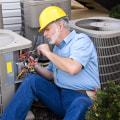20x25x1 HVAC Furnace Air Filters
When it concerns maintaining a healthy and effective HVAC system, the importance of air filters can not be overemphasized. Amongst the different sizes available, the 20x25x1 filter is a common choice for lots of homes. These filters play an important function in enhancing indoor air quality and guaranteeing that your heating system operates at its finest. Comprehending how these filters function and the particular particles they target is essential to maximizing their effectiveness.
Furthermore, knowing when and how to replace them can substantially affect the general effectiveness of your HVAC system. But what sets the 20x25x1 filters apart from others, and how can you guarantee you're choosing the best one for your home? Let's explore these concerns further to reveal the advantages and factors to consider associated with these HVAC heater air filters.
Benefits of 20x25x1 Filters
When thinking about HVAC heating system air filters, the benefits of utilizing 20x25x1 filters are vital for ideal air quality and system efficiency. These filters not only help in trapping dust, pollen, and other air-borne particles but also add to cost savings and energy effectiveness. The 20x25x1 HVAC furnace air filters are created to effectively remove pollutants from the air, enabling the HVAC system to operate efficiently without clogs or minimized airflow. This enhanced efficiency leads to lower energy consumption, reducing the general operating expense of the system.
Moreover, the ecological effect of using 20x25x1 filters is significant in promoting sustainability. By catching toxins and preventing them from distributing in the air, these filters add to improving indoor air quality while also reducing the stress on the environment. Sustainable practices, such as routinely changing and correctly getting rid of these filters, further boost their environmental benefits. In general, investing in 20x25x1 filters for HVAC systems not only ensures cleaner air and much better system efficiency but likewise aligns with eco-friendly practices for a greener future.
Importance of Indoor Air Quality
Ensuring excellent indoor air quality is crucial for keeping our health and well-being. Clean air lowers the risk of respiratory problems and allergic reactions, promoting a healthier living environment. Carrying out efficient approaches to enhance air quality, such as utilizing premium air filters, can improve the total lifestyle of occupants.
Health Benefits of Clean Air
Indoor air quality plays a crucial role in safeguarding the health and wellness of people within an area. Clean air benefits are particularly significant for individuals with allergies, as premium air filters can assist in eliminating irritants such as dust, pollen, and pet dander, decreasing the triggers for allergies. Improved breathing health is another essential advantage of tidy air, as it reduces the inhalation of toxins that can aggravate the lungs and intensify conditions like asthma. In addition, good indoor air quality has been connected to much better sleep quality, as fresh and tidy air promotes relaxation and can result in more peaceful sleep patterns. Prioritizing clean air in indoor environments is vital for maintaining overall health and lifestyle.
Methods to Improve Air
Provided the vital importance of preserving clean air for health and wellness, implementing efficient techniques to boost indoor air quality is crucial. Air purification methods play a vital role in removing contaminants and enhancing air quality. Making use of air purifiers with HEPA filters can help lower allergens such as dust, pollen, and animal dander. Additionally, managing indoor humidity levels between 30 and 50% can prevent mold development and allergens, further enhancing air quality. Routinely changing HVAC heater air filters is necessary for allergen decrease and maintaining effective airflow. Energy-saving suggestions like sealing air leaks and proper insulation not only save energy but also contribute to better indoor air quality by preventing outdoor pollutants from getting in.
How 20x25x1 Filters Work
Effectively trapping airborne particles to maintain cleaner indoor air, 20x25x1 filters work by utilizing a great mesh material that captures dust, pollen, and other impurities as air travels through them. The filtering process overview of 20x25x1 filters involves the air flowing through the filter media, which includes tightly woven fibers designed to catch particles. As air relocates through the filter, the mesh material serves as a barrier, trapping particles such as dust, germs, mold spores, and animal dander.
The design of the 20x25x1 filter ensures that the air circulation characteristics are optimized for efficient filtration. The size and density of the mesh enable enough airflow while capturing a high portion of pollutants. By capturing these particles, the filter helps enhance indoor air quality, making it vital for preserving a healthy home environment. Appropriate maintenance, consisting of regular filter replacements, is vital to guarantee the filter continues to work efficiently in trapping airborne pollutants.
Common Airborne Particles Filtered
Air filters, such as 20x25x1 filters, efficiently capture a range of common air-borne particles to improve indoor air quality. These filters are created to target common contaminants found in indoor environments, such as dust mites, pollen, pet dander, mold spores, and lint. The efficiency of 20x25x1 filters in trapping these particles plays an essential function in maintaining tidy and healthy indoor air.
Common toxins like dust mites are tiny organisms that prosper in indoor environments, triggering allergies and breathing concerns. Pollen is another common airborne particle that can enter homes through open doors and windows, causing discomfort for allergy victims. Pet dander, consisting of small flecks of skin shed by animals, can also circulate in the air and result in allergic responses if not strained successfully. Mold spores are airborne particles launched by mold colonies, posing health dangers when breathed in. Additionally, lint from fabrics and textiles can collect in the air, especially in laundry spaces. The high filter performance of 20x25x1 filters guarantees that these typical contaminants are recorded, enhancing indoor air quality and promoting a healthier living environment.
Replacing Filters for Optimal Performance
To guarantee your HVAC system operates effectively, it's crucial to be mindful of the filter size, replacement frequency, and appropriate installation methods. Understanding the significance of these points will not just improve the air quality in your home but also extend the lifespan of your furnace. Let's explore the significance of these elements in maintaining optimum efficiency for your HVAC system.
Filter Size Importance
Making sure the right size of the HVAC heater air filter is vital for maintaining optimal performance and efficiency. Filter effectiveness and sizing go together when it concerns the functionality of the HVAC system. A filter that is too small might allow dust and debris to bypass, decreasing filter efficiency and possibly causing damage to the system. Alternatively, a filter that is too big may not fit effectively, resulting in air leaks and reduced performance. Additionally, the filter product and lifespan are likewise influenced by the filter size. Utilizing the right-sized filter guarantees that the filter product is made use of efficiently, extending its life expectancy and optimizing its performance in capturing impurities. Therefore, choosing the right size filter is vital for the overall efficiency of the HVAC system.
Replacement Frequency Tips
For maintaining the HVAC system's efficiency and extending its life expectancy, adhering to a suggested replacement frequency for air filters is essential. Proper filter upkeep is important in ensuring sure ideal efficiency of the system. It is typically advised to change basic 1-3 inch filters every 30-60 days, while thicker filters may last approximately 6 months. However, elements like pets, allergies, and home air quality can reduce a filter's lifespan, necessitating more frequent replacements. Disregarding filter replacement can result in decreased airflow, reduced effectiveness, and potential damage to the HVAC system. By staying attentive to filter replacement schedules and thinking about private household requirements, house owners can effectively uphold the system's efficiency and longevity.
Installation Best Practices
Carrying out proper setup methods when changing HVAC heating system air filters is essential for keeping optimum system performance. Filter upkeep plays an important role in ensuring the effectiveness and longevity of the HVAC system. When installing a new filter, it is necessary to follow the producer's standards relating to sizing and compatibility. Make certain to examine the instructions of airflow shown on the filter to ensure it is installed properly. Furthermore, examine the filter housing for any indications of damage or debris that might impede appropriate airflow. Proper setup strategies also involve safely sealing the filter in place to prevent air bypass. By sticking to these finest practices, you can improve air quality, boost system effectiveness, and prolong the life of your HVAC devices.
HVAC System Efficiency Impact
Taking full advantage of the performance of HVAC systems is important for lowering energy usage and enhancing efficiency in property and commercial structures. One key aspect that substantially affects HVAC system performance is the routine upkeep of air filters. By ensuring appropriate filter upkeep, not only can energy cost savings be attained, but system longevity and optimal air circulation can also be maintained.
Frequently changing or cleaning HVAC air filters prevents dust and debris accumulation, enabling the system to run more efficiently. Clogged-up filters limit air flow, requiring the system to work harder to maintain the desired temperature level, causing increased energy usage. This additional stress can also shorten the system's lifespan and outcome in pricey repair work or replacements. Furthermore, tidy filters assist in much better air circulation, enhancing indoor air quality and general convenience while decreasing strain on the system.
Tips for Choosing Quality Filters
Ensuring optimal efficiency and longevity of HVAC systems heavily counts on selecting premium air filters that fulfill the system's particular requirements and standards. When choosing air filters, thinking about the filter lifespan is important. Filters with longer lifespans can minimize the frequency of replacements, saving both money and time in the long run. It is important to check the manufacturer's suggestions for filter replacement periods to ensure the system works efficiently.
Another vital factor to consider is the filter product type. Various filter materials use varying levels of filtration efficiency and airflow resistance. Common filter product types consist of fiberglass, pleated material, electrostatic, and HEPA filters. Fiberglass filters are cost-efficient however use very little filtration, while pleated fabric and electrostatic filters offer much better air quality by catching smaller-sized particles. HEPA filters, known for their high effectiveness, are perfect for individuals with allergies or respiratory conditions.
Frequently Asked Questions
Can Using a Higher MERV Rating Filter Like a 20x25x1 Improve My HVAC System's Energy Efficiency?
Using a higher MERV ranking filter such as a 20x25x1 may improve your HVAC system's energy effectiveness by boosting air quality and lowering pressure on the system. However, beware of prospective airflow restrictions that can impact efficiency. Regular filter maintenance is essential for system durability.
Are There Any Potential Health Risks Associated With Using a 20x25x1 Filter in My Home?
Utilizing a greater MERV ranking filter like a 20x25x1 may affect air quality and filter efficiency, potentially causing health implications. These filters can trap more impurities, however, make sure proper airflow to prevent stress on your HVAC system.
How Often Should I Change My 20x25x1 Filter to Ensure Optimal Performance and Indoor Air Quality?
Regular filter upkeep is important for ideal performance and indoor air quality. Elements like seasonal modifications affect frequency. Changing a 20x25x1 filter every 1-3 months is cost-effective and ensures clean air circulation.
Are There Any Specific Brands or Types of 20x25x1 Filters That Are Recommended for Households With Pets or Allergies?
When thinking about filters for homes with pets or allergies, focus on those developed to record animal dander and allergens. Select filters with high MERV scores for enhanced purification performance and change them every 2-3 months to maintain ideal indoor air quality.
Will Using a 20x25x1 Filter in My HVAC System Have Any Impact on the Overall Lifespan of the System?
Utilizing a 20x25x1 filter in your HVAC system can impact system longevity. High filter efficiency might increase lifespan by reducing pressure on parts. Routine upkeep is vital for optimal performance, conference air quality requirements, and ensuring effective operation.
Here is the nearest branch location serving the Miami area…
Filterbuy HVAC Solutions - Miami FL
1300 S Miami Ave Unit 4806, Miami, FL 33130
(305) 306-5027
https://maps.app.goo.gl/N1ptpYt3W6i92Xbt6






